NOTE: DE PALMA WILL NOT BE AT SATURDAY 'PASSION' SCREENING IN NY

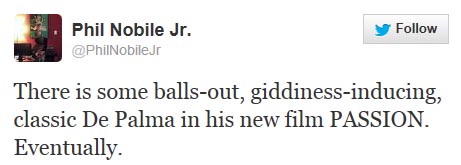

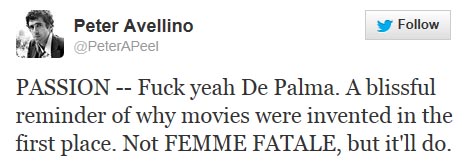
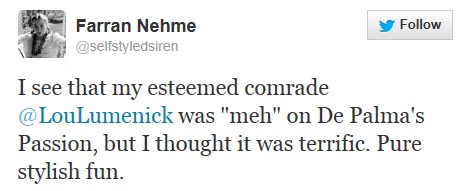
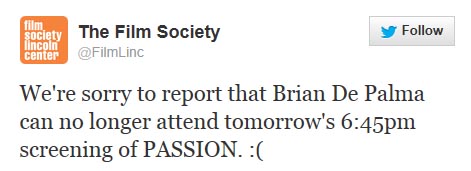
Updated: Saturday, August 31, 2013 3:23 PM CDT
Post Comment | Permalink | Share This Post
 Hello and welcome to the unofficial Brian De Palma website. Here is the latest news: |
|---|
E-mail
Geoffsongs@aol.com
-------------
Recent Headlines
a la Mod:
Listen to
Donaggio's full score
for Domino online
De Palma/Lehman
rapport at work
in Snakes
De Palma/Lehman
next novel is Terry
De Palma developing
Catch And Kill,
"a horror movie
based on real things
that have happened
in the news"
Supercut video
of De Palma's films
edited by Carl Rodrigue
Washington Post
review of Keesey book
-------------
Exclusive Passion
Interviews:
Brian De Palma
Karoline Herfurth
Leila Rozario
------------
------------
| « | August 2013 | » | ||||
| S | M | T | W | T | F | S |
| 1 | 2 | 3 | ||||
| 4 | 5 | 6 | 7 | 8 | 9 | 10 |
| 11 | 12 | 13 | 14 | 15 | 16 | 17 |
| 18 | 19 | 20 | 21 | 22 | 23 | 24 |
| 25 | 26 | 27 | 28 | 29 | 30 | 31 |
De Palma interviewed
in Paris 2002
De Palma discusses
The Black Dahlia 2006

Enthusiasms...
Alfred Hitchcock
The Master Of Suspense
Sergio Leone
and the Infield
Fly Rule
The Filmmaker Who
Came In From The Cold
Jim Emerson on
Greetings & Hi, Mom!
Scarface: Make Way
For The Bad Guy
Deborah Shelton
Official Web Site
Welcome to the
Offices of Death Records






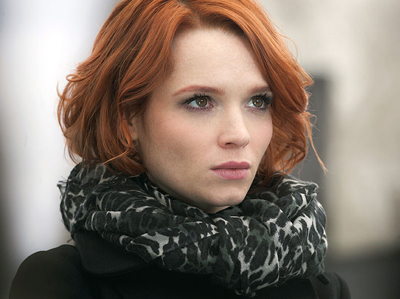 Karoline Herfurth has been acting in front of the camera since she was ten years old, when she appeared in the German television movie Holiday Beyond The Moon. After playing teenagers in several feature films, she gained international recognition for her role as "The Plum Girl," the initial victim in Tom Tykwer's Perfume: The Story Of A Murderer, which starred Dustin Hoffman, Ben Whishaw, and Alan Rickman. In 2008, she appeared with Kate Winslet and Ralph Fiennes in Stephen Daldry's Oscar-nominated adaptation of Bernhard Schlink's The Reader. That same year, Herfurth played dance student Lilli Richter in Caroline Links' A Year In Winter, a role which won her the Bavarian Film Award for best young actress. In 2010, Herfurth starred in We Are The Night, as a young woman drawn into a clan of female vampires.
Karoline Herfurth has been acting in front of the camera since she was ten years old, when she appeared in the German television movie Holiday Beyond The Moon. After playing teenagers in several feature films, she gained international recognition for her role as "The Plum Girl," the initial victim in Tom Tykwer's Perfume: The Story Of A Murderer, which starred Dustin Hoffman, Ben Whishaw, and Alan Rickman. In 2008, she appeared with Kate Winslet and Ralph Fiennes in Stephen Daldry's Oscar-nominated adaptation of Bernhard Schlink's The Reader. That same year, Herfurth played dance student Lilli Richter in Caroline Links' A Year In Winter, a role which won her the Bavarian Film Award for best young actress. In 2010, Herfurth starred in We Are The Night, as a young woman drawn into a clan of female vampires.Karoline Herfurth: I was simply asked by the casting agency that worked for Passion in Germany to audition for them. Then I was invited to come a second time to work with Brian De Palma himself on the scenes.
What were your thoughts upon reading the Passion screenplay? Were you previously familiar with the original French film by Alain Corneau?
No, I´ve never heard of it. But I loved the script and I was thrilled by the idea of working with Brian De Palma. Also working with such huge names like Rachel McAdams and Noomi Rapace was just overwhelming to me.
What was the rehearsal period like for this project?
We had a whole week to read the script and ask all the questions we have with the story and the characters. It was very intense and a special experience to me, to see Rachel, Brian and Noomi working. Very Inspiring. I learned a lot from these days.
Can you think of anything specific that was perhaps changed or altered after playing it out in rehearsals?
Brian is a Visionary. He knows exactly what he needs for his movie. And he sees every little thing you play for him. For me it was more about understanding what he wants me to do, not to change anything.
Was it a fun change of pace to be able to speak German in some of the scenes?
For me it is weird to switch between the languages. English is a whole other world. It´s like being in an phantasy already. Switching to German is mostly disturbing. It feels hard and dry. I love talking in English. It gives new possibilities of transformation to me.
I have to ask-- Was the "Ass Cam" commercial actually shot from a camera in your own back pocket?
Yes, partly it was :-)
What was it like to work with Brian De Palma on the set? Can you recall any specific direction he gave that stands out in your mind?
Yes. There is this moment, when my character sees through the window into the restaurant and watches her love Isabelle flirting with another man, and, in her eyes, betraying her. Brian wanted me to walk to a certain point, see the two, be hurt and then cry. He was very exact with the timing and I had to redo it certain times. When I finally had it done, he came to me and kissed my forehead without saying any more. He exactly knows, what it means to play those scenes for an actor. He demands everything from you as an actor, but if you give it to him, he sees it as a present and is thankful. He knows that it means giving a part of your soul. And that is very special.
You wrote and directed a short film, Mittelkleiner Mensch, that was well-received at some film festivals last year. How did that come about? And how was the experience of making the film?
In the beginning it was just a joke and to have a little fun with some friends. But after a while it became more serious and kind of developed its own dynamic. It was like a little monster that grew bigger and bigger and all I could do was feed it, because it was hungry. I think, mostly, making movies feels like that. But it is the greatest and most passionate thing to do in the world I could think of. And I loved it. For the first time I was never bored, not for a second. It was a very fulfilling experience.
Do you think you might direct a feature film someday?
I hope so. There is a movie planned for next year :-)
Did you learn anything new about filmmaking while working on Passion?
Yes. A lot. Brian is a director who is prepared to the very last bit. That is very important for a shooting day. Then he knows exactly what he wants without being closed to impulses. To me that is a very important skill and fine balance a director needs to have. Also, the professional way of working, and the script, and on the set watching Rachel and Noomi impressed me.
Was it fun working with Rachel McAdams and Noomi Rapace?
Yes, a lot. They are fine and very nice colleagues. We had a lot of fun and I loved working with them and learning from them.
Follow Karoline Herfurth on her Facebook page.
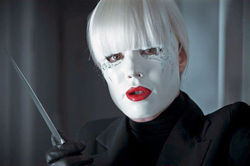 Deadline includes Passion in its Specialty Box Office preview this week, informing that "Entertainment One will open it Labor Day weekend in 14 cities including New York and L.A. It will expand to the top 25 to 30 markets based on performance." Meanwhile, here are some more of the reviews that are coming in:
Deadline includes Passion in its Specialty Box Office preview this week, informing that "Entertainment One will open it Labor Day weekend in 14 cities including New York and L.A. It will expand to the top 25 to 30 markets based on performance." Meanwhile, here are some more of the reviews that are coming in:Armond White, City Arts
"Apparently nothing in this old-hat story of corporate skullduggery and female betrayal stimulated DePalma creatively as Hitchcock, Lang, Welles and Godard used to–so he also rehashes himself: Passion offers familiar DePalma tropes from multiple point-of-view imagery, T&A shots to an aggressive/seductive Pino Donaggio music score, even a split-screen sequence. Strangely, there’s no teasing slo-mo; a lack that suggests tepid enthusiasm."
Binx Bolling, City Arts
POSSIBLE SPOILERS-- "The final, overhead shot of Brian De Palma’s Passion twists to reveal an inverted diptych a la Masahiro Shinoda’s Double Suicide. The shot denotes two things: 1) one character waking from a nightmare and, then, 2) another character murdered. The shot also connotes two things: 1) guilt and 2) fear of punishment. It confirms the film’s relationship dynamics as based on authority and power...
"Later, in the events leading up to the murder and following in its investigation, De Palma and dp Jose Luis Alcaine use stylized lighting and wide-angle lenses to approximate a barbiturate p.o.v.—but this proves another red herring (aimed at fooling both the legal authorities and the movie audience).
"Finally, the appearance of a fictional twin (the return of the authority figure) begins the climactic nightmare. In it, the boss brings vengeance upon her subordinate in wild De Palma fashion: slow motion signifies dread inevitability in every impotent effort to dispose of evidence and regain control of the narrative."
Damon Houx, Screen Crave
"The Maestro is back! For those who’ve loved his thrillers like Sisters, Carrie, Dressed to Kill, Body Double, etc. this is a delight. And though it’s disappointing that a great piece of film like this only gets a limited release and is mostly avaiable through VOD, it’s one of the best films of the year."
Lou Lumenick, New York Post
"Auterist critics have been raving about De Palma using a split screen to show a murder and a ballet performance simultaneously ever since this played last fall’s festival circuit. But really, exactly what narrative purpose does this serve?"
Owen Gleiberman, Entertainment Weekly
"Passion, Brian De Palma's voluptuously ludicrous new thriller, features his buzziest cast in a while, and the presence of Rachel McAdams and Noomi Rapace seems to have rooted him — at least for the first half. The movie starts out as a reasonably contained satire of office politics. McAdams uses her sexy billboard smile and emphatic delivery to nail a certain type of troublemaker boss who embeds her aggression in pert 'sincerity.' And Rapace, who appears tremulous and servile but may be a more competitive head case, keeps you guessing.
"The women's sisterly bond teeters into romance and then treachery, but it's all just an excuse for De Palma to go wild with indulgence. Having kept his gliding-camera 'Hitchcockian' impulses in submission for close to an hour, he then gives in to them like a recovering alcoholic reaching for a shot of Wild Turkey. Why, for five minutes, does half the screen show McAdams walking through her house, tracked by camera movement that's less Hitchcockian than Halloween-ian, while the other half depicts the ballet performance Rapace is attending? Passion turns into vintage De Palma — which is to say, the film seems almost engineered to get you giggling at the extravagance of its absurdity. Any enthusiasm in the viewer is bound to be a shadow of the film's passion for itself."
Justin Craig, FOX News
"One of the great joys of any De Palma film is getting swept up in the cinematography, editing and music. Whether or not the acting or story work in any given De Palma film, you can almost guarantee a masterful aural and visual canvas. De Palma’s frequent composer Pino Donaggio’s noirish score fervently delivers seduction and suspense from start to finish. José Luis Alcaine’s cinematography is visceral and striking; shots pop like a sleek magazine ad and often lingers right on the edge of inclusion, as if the audience is watching a psychological experiment from behind a double mirror."
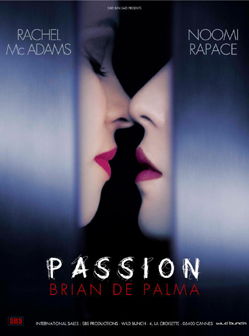 Reviews of Passion are proliferating-- here are some samples:
Reviews of Passion are proliferating-- here are some samples:Michael Koresky, Reverse Shot
"If it’s difficult to tell what’s business and what’s personal in the film’s intricate set-up, it’s even harder to separate reality from fantasy as the film slithers along to its boffo third act. Here is where De Palma breaks most drastically from Corneau’s film, plummeting down a rabbit hole of delirium that proves he was just using the original narrative as a basic skeleton to indulge in the ridiculous sublime. Whereas Corneau set his narrative up in a clinical and cold-blooded manner (perfectly acceptable for the sleek austerity of the setting), De Palma plunges into excess, positing the characters’ actions as dreams within dreams, and using nightmarishly canted frames and elegant split-screens to toy with both the audience’s perspective and his characters’ subjectivity (Pino Donaggio’s driving, tango-ish score begins to have an identity crisis of its own, starting to sample bits from Debussy’s 'Prélude à l’après-midi d’un faune,' foreshadowing a thrillingly staged ballet scene). There’s an audacity to this that elevates it far above matters of style: De Palma is making pliable a rigidly established film that had clear emotional in and out points, reconfiguring its emotional makeup in a way that confuses, or even rejects, easy identification—with both character and reality."
Glenn Heath Jr., San Diego City Beat
"Brian De Palma's lustrous thriller Passion is one nasty parlor game. It constructs a sleek 21st-century world where fantasy is as pervasive as technology or sex. The desire to fulfill such urges drives us to befriend and betray, compete and consume.
"Hints of primary color populate the crisp modern architecture and décor, giving reality a dreamlike glow and infusing delusions with a scary sense of contorted normalcy. Sometimes, even hallucinations have hallucinations."
Sean Burns, Philadelphia Weekly
"Such are the vagaries of arthouse distribution these days that works by the masters now premiere on your cable box. Following in the footsteps of Terrence Malick’s To the Wonder and Paul Schrader’s The Canyons, Brian De Palma’s Passion opens this weekend in a scant few cinemas, but is already available via Video on Demand. I wish it were possible to see Passion on a big screen locally because it’s a kinky corker, the most gloriously lurid and downright De Palma-est Brian De Palma movie since 2002’s Femme Fatale, which I may have once watched twice in a row just to soak in all the sleazy, giddy abandon. (I might have done the same with Passion, but I’m not ready to admit as much in public just yet.)"
Marshall Fine, Hollywood and Fine
"Passion isn’t Brian De Palma’s first remake, but it may be his worst: an over-inflated, melodramatically hot-blooded version of what was a cool French thriller."
Drew C. Taylor, U.K. Film News
"A significant, and powerful change made by De Palma was in making the lead characters closer in age. The competitiveness has a more natural feel, like the kind that might arise between siblings. This shift in the interpersonal dynamic between Christine and Isabelle helps the film focus on the occasionally poisonous dynamic between women in the workplace without also bringing in the psychological baggage of age.
"With Rachel McAdams, De Palma attempts to give us a femme fatale we ultimately hate ourselves for desiring. So selfish, so self serving, so morally thin and sadistic, McAdams presents a Christine who fears – at any moment – she could be interchanged with any colleague, especially Isabelle. So hungry for power and recognition, Christine is the embodiment of everything a person could come to fear in a co-worker."
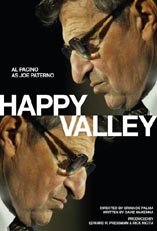 At last week's Summer Talks discussion at the Lincoln Center, our old friend Brett was in the audience, and got to ask Brian De Palma a question about Happy Valley. Here is my transcription of the exchange from the video of the event:
At last week's Summer Talks discussion at the Lincoln Center, our old friend Brett was in the audience, and got to ask Brian De Palma a question about Happy Valley. Here is my transcription of the exchange from the video of the event:De Palma: Well, it’s indeed a tragic story, and it’s a part Al wants to play. I mean, that’s how it all started. You know, and it’s a great honor to direct Al. He’s, you know, one of the greatest actors of his generation. So, in order to tell it in a fair way, I mean, it’s sort of like Lawrence Of Arabia. Everybody has a different view on what happened. So the idea of the script is to try and represent each view equally, and let the audience try to figure out what exactly happened and who’s culpable.
On August 29, Vanity Fair posted an interview with De Palma by Jason Guerrasio, who also asked De Palma about Happy Valley, and about working with Pacino again. "It’s a fantastic part for him," De Palma told Guerrasio. "It’s almost like a King Lear–type of part. When you look at something like Scarface you see the incredible performance he gives. It’s always exciting for a director to work with someone like that." Guerrasio then asked if he and Pacino had talked yet about how he's going to play Paterno. "Oh yeah," De Palma replied, "we've exchanged extensive e-mails. It has begun."
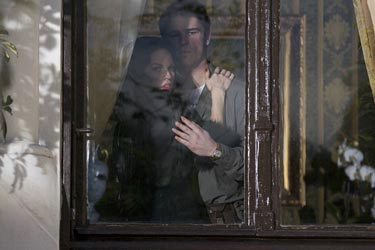 Jacob Knight at Very Aware has posted a wonderfully-written ranking of 28 Brian De Palma features (he left Dionysus In '69 off the list).
Jacob Knight at Very Aware has posted a wonderfully-written ranking of 28 Brian De Palma features (he left Dionysus In '69 off the list).Throughout the article, Knight keeps a running focus on autobiographical elements in De Palma's films, citing, for instance, Jason Zinoman's profile of De Palma for the book Shock Value in his entry on Dressed To Kill (#4). Knight's top three De Palma films are (#1) Blow Out ("the ending... solidifies Blow Out as De Palma’s bonafide masterwork"); (#2) Phantom Of The Paradise ("a careening bullet of pop art"); and (#3) Body Double (a "cinematic explosion meant to intoxicate those who are as in love with form as its director").
Also in Knight's top ten are a couple of surprises: Snake Eyes at number six, Mission: Impossible at number eight, and The Black Dahlia at number nine. De Palma's latest film, Passion, ranks at number 17. Of the latter, Knight writes, "There’s something to be said about De Palma’s choice of setting for the Berlin ad office — a towering building made entirely of glass. Not only does it feel like an on-the-nose visual representation of the 'ceiling' all female employees face as they navigate the current corporate climate, but also a metaphor for the lack of transparency all of these characters share. While we the audience can see through the walls of this crystal shrine to capitalism, each character holds up a shield of deception to stop the other from seeing their next move. It’s a brilliant bit of location scouting, as De Palma yet again finds a perfect way to convey an idea without using a single word."
At the bottom of Knight's list is Raising Cain, which Knight feels is hurt by De Palma's seeming lack of interest in that type of thriller at that point in time. And he has The Untouchables at number five, writing of the latter, "This is pulp on an epic, exciting level that takes both balls and chops in equal quantity to pull off."